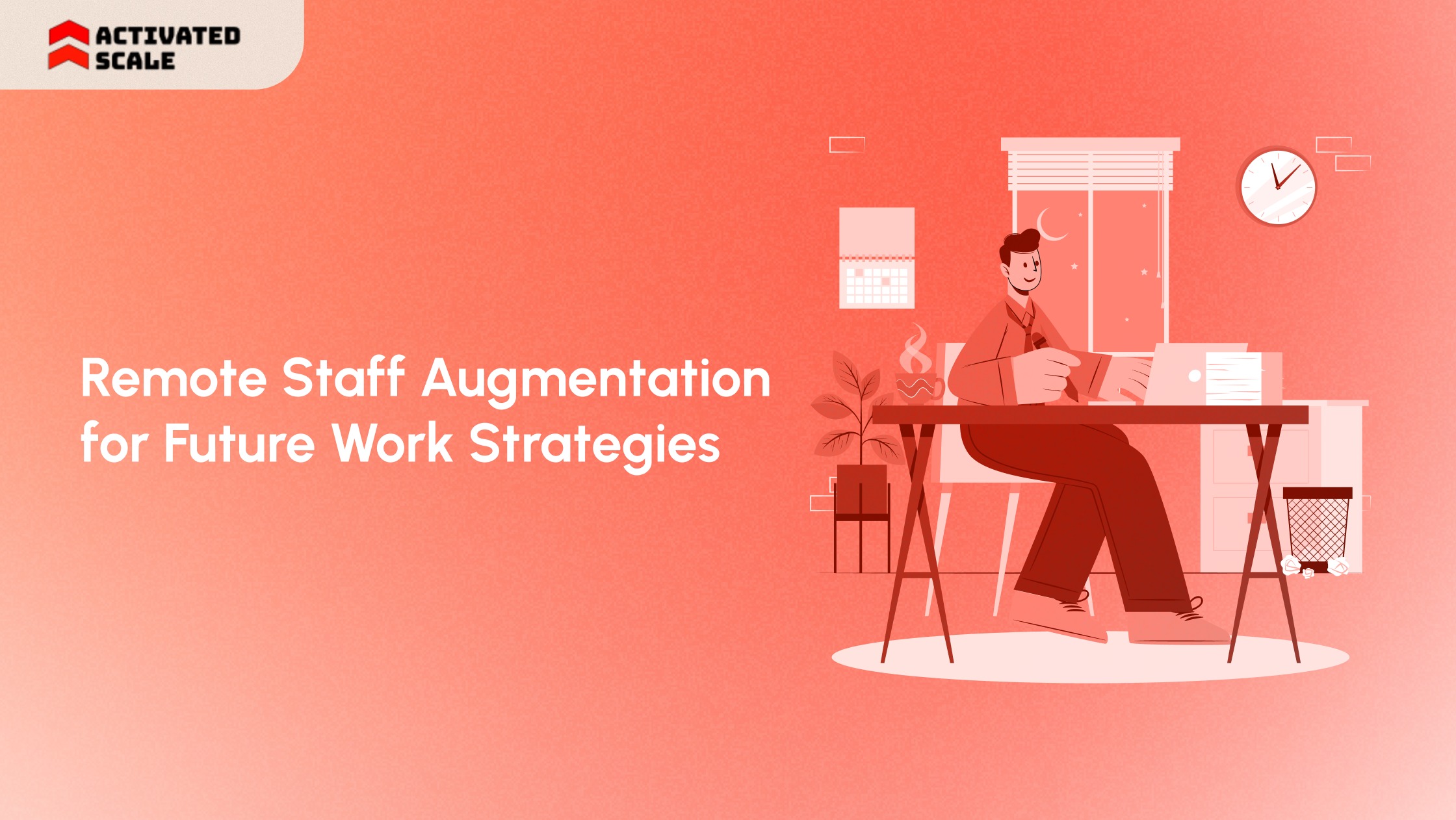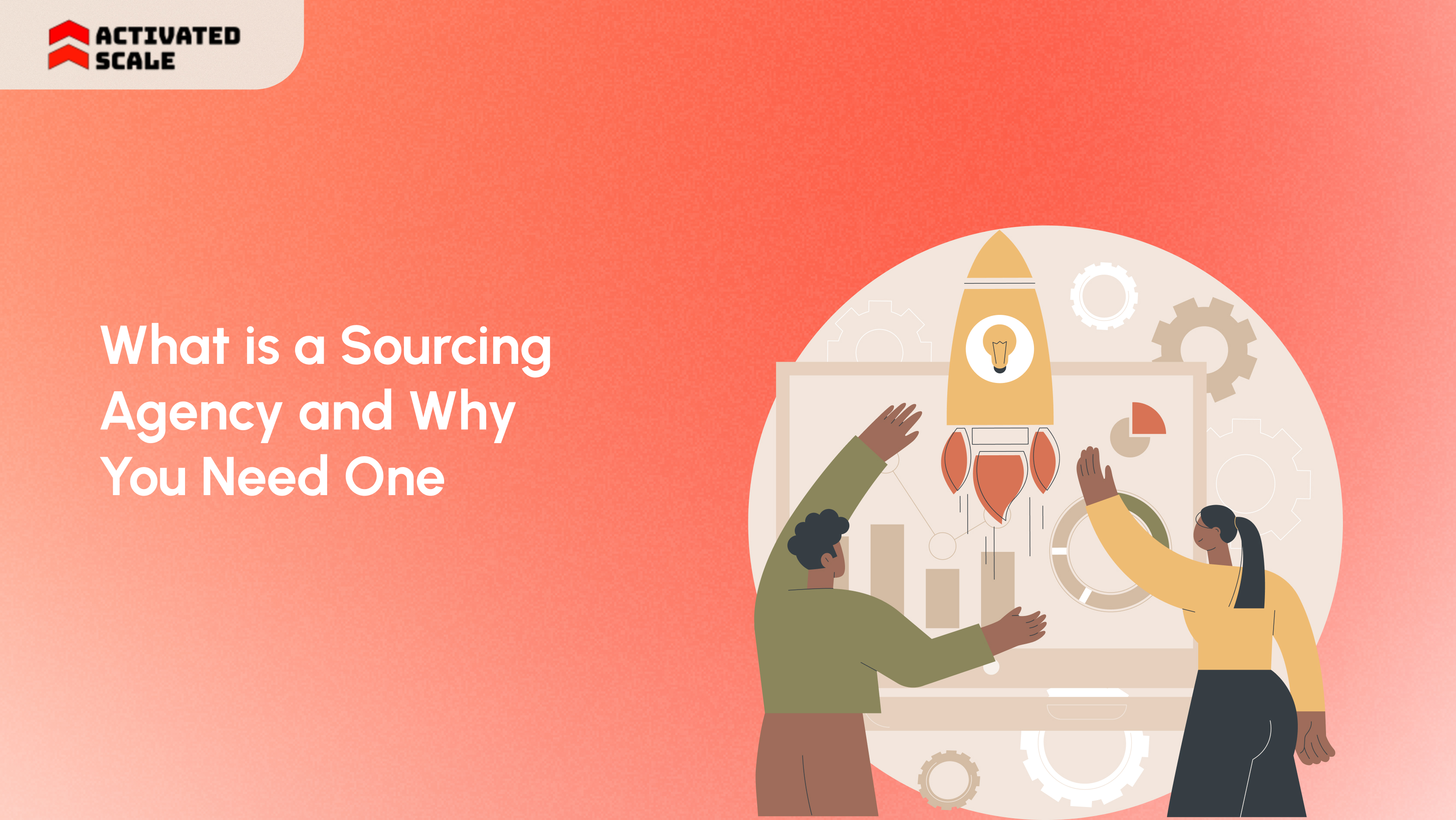In 2025, 37% of small businesses will be outsourcing at least one business process.
Outsourced sales is becoming one of the most popular choices for those seeking growth without the overhead.
For small businesses, the payoff is real:
79% of companies using outsourced sales providers say they’ve expanded more quickly as a result.
In this guide, you’ll come across the best outsourced sales strategies tailored for small businesses like yours. You’ll learn how to overcome common challenges, choose the right partner, and make outsourcing work for your unique goals.
Key Summary (TL;DR)
- Cost-Effective Sales Solutions: Outsourced sales help small businesses access expert talent and tools without the cost of an in-house team.
- Flexible Outsourcing Models: Options like lead generation, full-cycle sales, hybrid, and staff augmentation cater to various business goals and budgets.
- Successful Outsourcing Key Factors: Clear goals, careful partner selection, onboarding, integration, and performance monitoring are essential for success.
- Activated Scale’s Support: Activated Scale provides vetted sales professionals, flexible hiring, fast onboarding, and full sales support for efficient growth.
What is Sales Outsourcing?
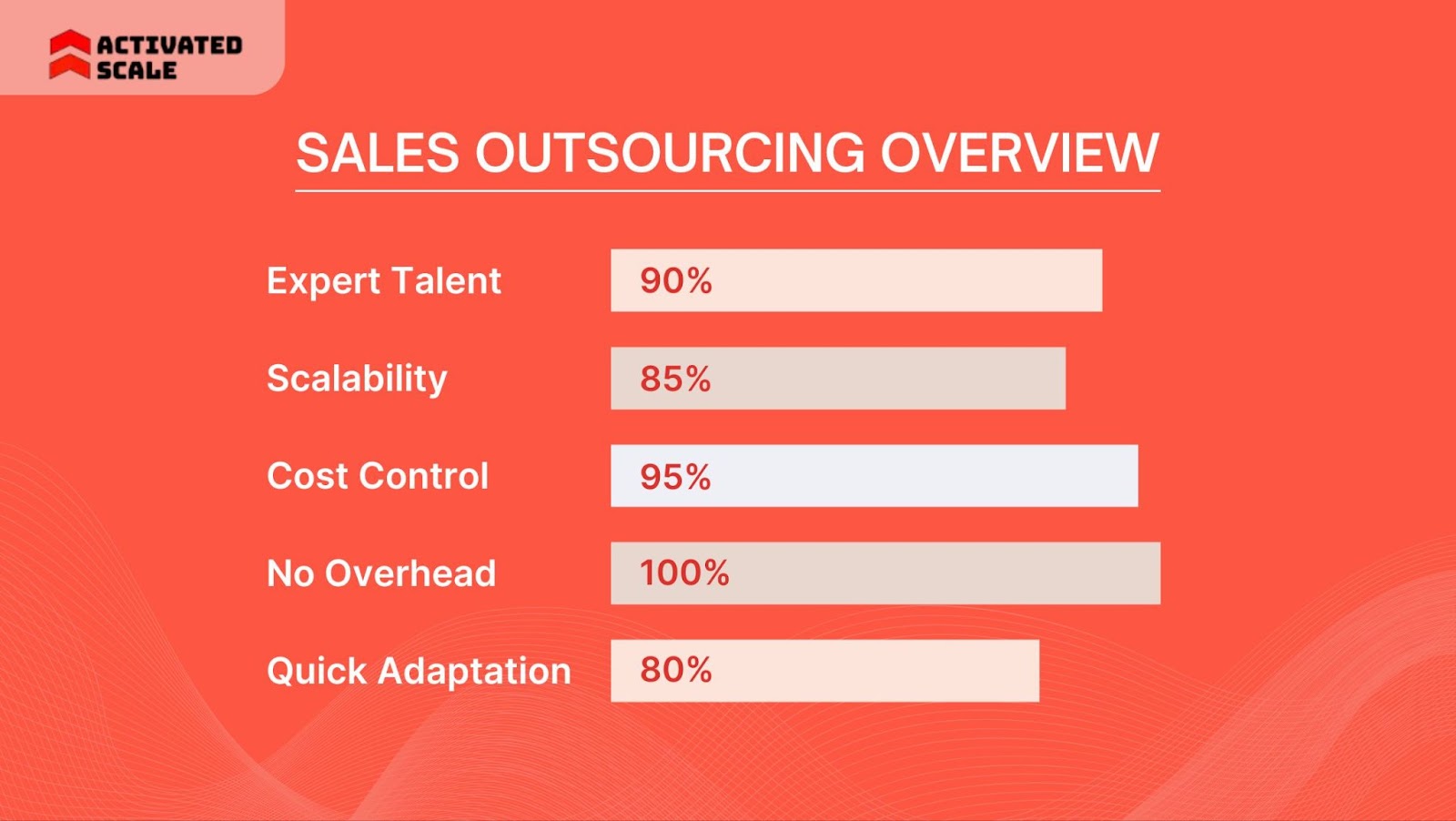
Sales outsourcing is when a business delegates all or part of its sales activities to an external provider.
Instead of hiring, training, and managing a full in-house team, you partner with specialists who handle lead generation, sales calls, closing deals, or even the entire sales cycle.
This approach allows small businesses to access expert talent, scale quickly, and control costs, all without the overhead of permanent hires.
Types of Sales Outsourcing Models
Small businesses can choose from several outsourcing models depending on their goals, budget, and level of involvement required. Here’s a breakdown of the most common models:
Key Benefits of Outsourcing Sales for Small Businesses
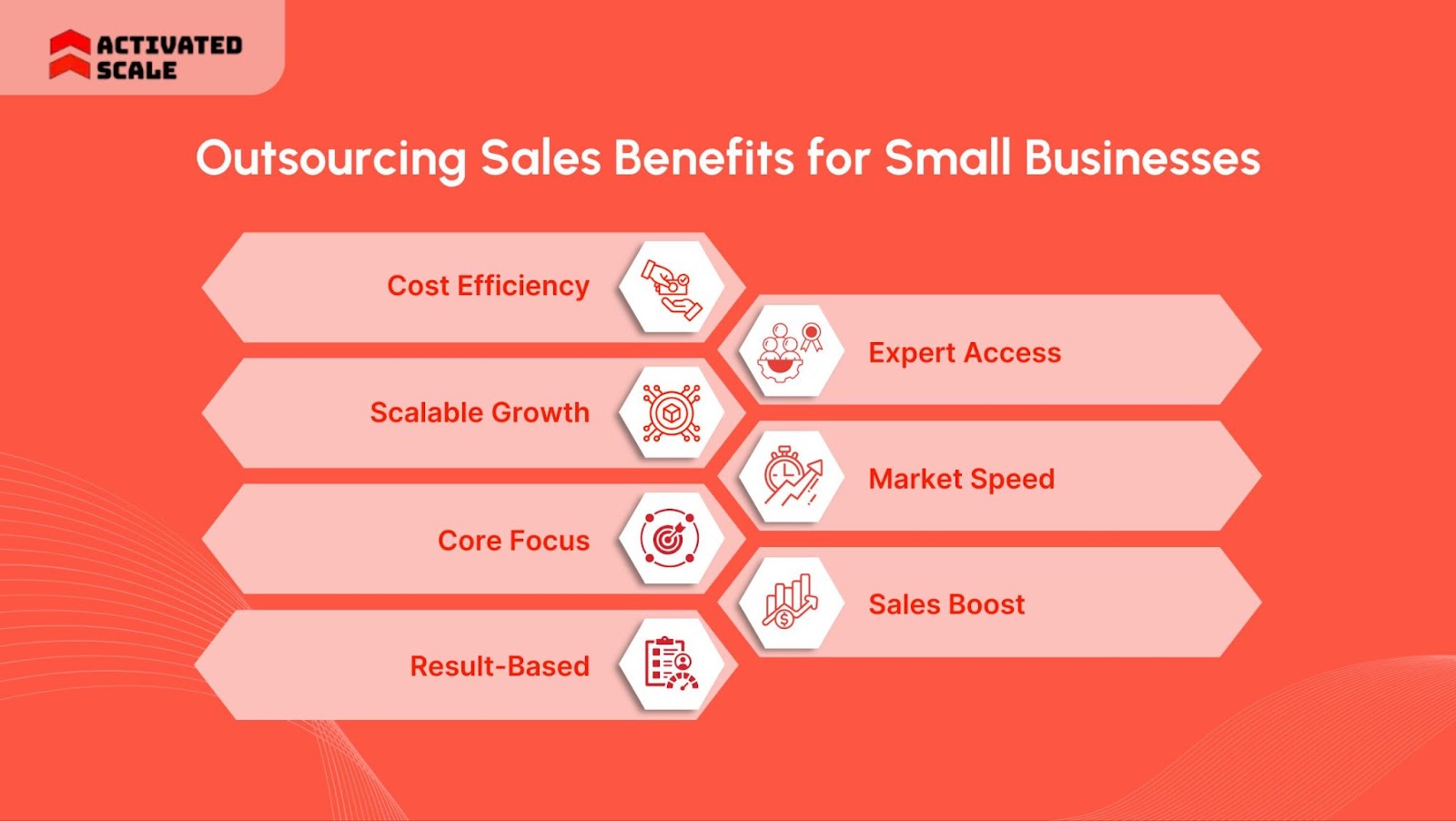
Outsourcing sales can be a game-changer for small businesses aiming to grow without the heavy burden of building and managing a full in-house sales team. Here’s how using outsourced sales strategies can deliver real, measurable value:
1. Significant Cost Savings
Outsourcing sales can reduce operational costs by 30% to 50%.
Instead of investing in full-time hires, small businesses pay only for the level of service they need, turning fixed expenses into flexible, performance-based costs.
2. Access to Specialized Expertise
Partnering with an outsourced sales provider gives you immediate access to experienced sales professionals and industry specialists. They often come with knowledge and skills that would be expensive or difficult to hire internally.
This expertise translates into better strategies, faster execution, and higher win rates. In fact, businesses using outsourced sales expertise and tools report a 35% increase in lead conversion rates.
3. Scalability and Flexibility
One of the top advantages is the ability to scale your sales efforts up or down as your business needs change.
Outsourcing allows you to quickly adjust to needs like launching a new product, entering a new market, or handling seasonal demand, without the hassle of hiring or layoffs.
4. Faster Market Entry
Outsourced sales teams bring established processes, databases, and tactics, helping small businesses enter new markets or launch products faster than starting from scratch. This speed can be critical for capturing opportunities ahead of competitors.
5. Focus on Core Business Functions
Companies that focus on their core functions while outsourcing sales report a 25% increase in overall business efficiency. By delegating sales activities, business owners and teams can concentrate on what they do best: product development, customer service, and strategic planning.
6. Enhanced Sales Performance
With proven sales strategies, advanced tools, and continuous performance monitoring, outsourced sales teams consistently deliver better results.
Businesses that outsource their sales functions have seen an average increase in sales revenue of 30% within the first six months.
7. Performance Accountability
Most outsourced sales providers work on performance-based contracts, tying their compensation to measurable results like closed deals or qualified leads.
This results-driven approach ensures that your outsourced team is motivated to deliver tangible outcomes.
Outsourced Sales Strategies That Deliver Results
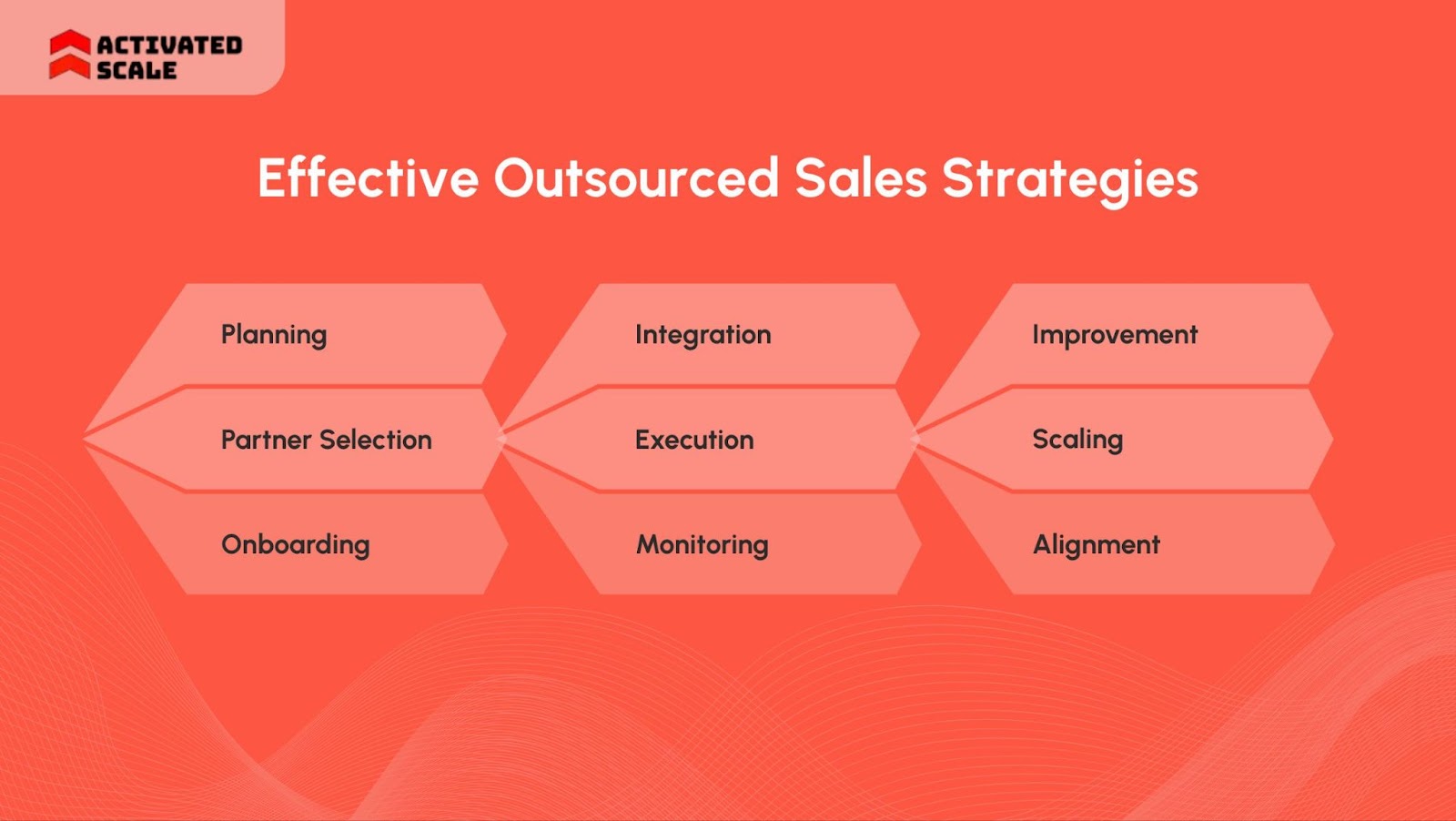
Outsourcing your sales function can be transformative, but only when approached with a clear, structured strategy. Here’s how to ensure your outsourced sales partnership delivers measurable growth and lasting value:
1. Strategic Planning and Goal Setting
Start by defining what you want to achieve with outsourced sales. Are you looking to enter new markets, increase lead volume, shorten your sales cycle, or reduce costs?
Collaborate with your outsourcing partner to set clear, measurable KPIs like monthly qualified leads, conversion rates, or revenue targets.
Tip: Use market and competitor analysis to set realistic benchmarks and identify gaps your outsourced team can fill.
2. Selecting the Right Outsourcing Partner
You know you need an outsourced sales partner, but the options seem endless. Instead of wading through generic advice, use these three “decision sprints” to cut through the noise and find a partner that truly fits your business.
Sprint 1: Define Your Non-Negotiables
Ask yourself:
- Do I need industry-specific expertise, or is process mastery more important?
- Is rapid scaling my top priority, or do I need deep, consultative selling?
- How much transparency do I require: do I want daily dashboards, or is weekly reporting enough?
Write down your top three non-negotiables. Any partner who can’t meet these is off the table.
Sprint 2: Test the Partner’s Adaptability
Give each finalist a real-world scenario:
- “If my product changes mid-quarter, how would you pivot your outreach?”
- “How do you handle a sudden spike in lead volume?”
- “Can you integrate with my existing CRM and reporting workflows without disruption?”
A true partner will offer clear, specific answers (not just promises) and demonstrate flexibility in their process.
Sprint 3: Experience the Partnership, Before You Commit
Request a trial project or pilot campaign:
- Set a short, focused goal (e.g., 30 qualified leads in 30 days).
- Observe how the partner communicates, adapts, and delivers.
- Evaluate not just the results, but the experience—did they feel like an extension of your team?
If a provider hesitates at a pilot or can’t deliver a seamless experience, it’s a sign to keep looking.
Red Flags to Watch
- Opaque Data Practices: If a partner can’t provide real-time dashboards or granular reporting, you risk flying blind.
- One-Size-Fits-All Playbooks: Avoid partners who don’t tailor strategies to your ICP or market nuances.
- Communication Lag: In a fast-moving sales environment, delayed responses can mean lost deals.
Connect with Activated Scale to see how a truly aligned partner can accelerate your sales, on your terms, with your metrics, and for your market.
3. Onboarding and Knowledge Transfer
A smooth onboarding process is essential for your outsourced sales team to represent your brand effectively and hit the ground running.
Action Steps:
- Prepare a digital onboarding kit with product sheets, customer personas, brand guidelines, and competitor insights.
- Schedule interactive training sessions, use role-play scenarios and Q&A to ensure understanding.
- Assign a dedicated internal liaison to answer questions and provide ongoing support.
Tip: Create a shared knowledge base (Google Drive, Notion, etc.) so both teams can access the latest resources anytime.
4. Integration and Communication Protocols
Seamless integration between your in-house and outsourced teams prevents silos and misalignment.
Action Steps:
- Set up regular check-ins (weekly or biweekly) for pipeline reviews and feedback.
- Use collaborative tools like Slack, Trello, or your CRM’s shared dashboards for real-time updates.
- Define escalation paths for urgent issues, know who to contact and how quickly you expect a response.
Tip: Rotate meeting facilitators between teams to foster joint ownership and fresh perspectives.
5. Execution: Implementing Sales Activities
Your outsourced team should operate as an extension of your in-house sales function, not a separate entity.
Action Steps:
- Clearly delegate tasks by specifying who handles lead sourcing, outreach, follow-ups, and closing.
- Provide scripts, templates, and outreach cadences, but encourage customization based on prospect feedback.
- Monitor early calls or emails and offer constructive feedback to fine-tune messaging.
Tip: Run “shadowing” sessions, let internal team members observe outsourced reps (and vice versa) to align on best practices.
6. Performance Monitoring and Optimization
Constant measurement and adjustment are key to maximizing ROI from outsourced sales.
Action Steps:
- Track essential metrics like number of leads generated, conversion rates, deal velocity, and customer acquisition cost.
- Review reports together to look for trends, bottlenecks, and quick wins.
- Schedule monthly or quarterly performance reviews to recalibrate goals and tactics.
Tip: Set up automated dashboards for real-time visibility and faster decision-making.
7. Continuous Improvement and Agility
A growth-oriented outsourced sales strategy is never static, it evolves with your business and the market.
Action Steps:
- Encourage your outsourced team to propose new tactics or tools based on their frontline experience.
- Offer ongoing training on product updates, new features, or market shifts.
- Experiment with A/B testing for scripts, channels, or offers, and share learnings across both teams.
Tip: Hold quarterly “retrospectives” to celebrate wins, address challenges, and brainstorm improvements.
8. Scaling and Flexibility
One of the biggest advantages of outsourcing is the ability to adjust quickly as your needs change.
Action Steps:
- Use flexible contracts that allow you to scale the team up or down for product launches, seasonal spikes, or market tests.
- Regularly assess workload and pipeline health to anticipate when you’ll need more or fewer resources.
- Discuss expansion plans with your partner early so they can prepare talent in advance.
Tip: Pilot new markets or segments with a small outsourced team before committing more resources.
9. Ensuring Cultural and Brand Alignment
Your outsourced team should feel like a true extension of your company, embodying your values and voice.
Action Steps:
- Invite outsourced reps to internal meetings, product demos, and company updates.
- Share stories, customer testimonials, and feedback to reinforce your brand ethos.
- Regularly review customer interactions to ensure messaging and tone are consistent with your standards.
Tip: Celebrate shared successes, recognize top performers from both teams to build unity and motivation.
Also Read: Sales Pipeline Templates for Improved Tracking
Is Outsourced Sales Right for Your Business? (Quick Checklist)
If you’re a small business owner considering outsourced sales strategies, it’s essential to determine whether this approach aligns with your goals, resources, and growth plans.
Use this actionable checklist, customized for small businesses, to make an informed decision.
Quick Checklist: Should You Consider Outsourced Sales Strategies?
- Need to grow sales but don’t want to hire a full-time team?
- Struggling to find or close enough leads on your own?
- Want expert sales help without high costs or long-term commitment?
- Need flexibility to scale sales up or down quickly?
- Lacking time, tools, or resources to build a sales process in-house?
- Entering new markets or launching new products soon?
- Want to focus on your core business while experts handle sales?
- If you answered “yes” to three or more questions:
- Outsourced sales strategies could be a strong fit for your business,
- offering cost savings, expertise, scalability,
- and a clear path to growth.
- If you answered “no” to most questions: You may want to focus on strengthening your in-house sales capabilities or explore hybrid models.
Tip: Start with a pilot project or a flexible contract to test how outsourced sales works for your business before making a long-term commitment.
How Activated Scale Helps Small Businesses Grow with Outsourced Sales Strategies
Activated Scale connects small businesses and startups with vetted, US-based fractional sales professionals. Since 2021, the platform has been designed to help you scale your sales without the overhead of traditional hiring. With companies like Tango, Dresma.ai, and Confection using Activated Scale to grow, you can trust the platform to provide flexible, cost-effective sales solutions.
What Activated Scale Does:
- Fractional and Full-Time Sales Talent:
You can hire experienced Sales Development Representatives (SDRs), Account Executives (AEs), and VPs of Sales on a part-time or full-time basis. This allows you to scale your sales efforts without committing to full-time salaries.
- Vetted and Industry-Specific:
All sales talent is pre-vetted for experience and industry fit, so you get professionals who can deliver results from day one.
- Try-Before-You-Hire Model:
Test sales talent for skills and cultural fit before committing to a long-term contract. If you find a match, you can convert them to a full-time hire.
- End-to-End Sales Support:
From prospecting and lead generation to closing deals, Activated Scale can manage the entire sales cycle, freeing up your internal resources and accelerating your go-to-market strategy.
- Rapid Onboarding:
The platform ensures fast onboarding, getting sales professionals up and running quickly, especially valuable if you need immediate impact.
- Automation and Reporting:
Activated Scale provides real-time data and reporting, using automation to help you track progress and optimize your sales performance easily.
Also Read: Pros and Cons of Hiring a Freelance Sales Representative
Conclusion
Outsourced sales strategies for small businesses offer a powerful pathway to growth. They enable access to expert talent, scalable solutions, and advanced technology without the overhead of building an in-house team.
By choosing the right partner and aligning on goals, small businesses can accelerate revenue, enter new markets, and focus on what they do best.
If you’re ready to explore the full potential of outsourced sales strategies, consider partnering with Activated Scale. It could be the practical solution you need to reach your next stage of growth.
FAQs About Outsourced Sales Strategy
1. Will outsourcing sales mean I lose control over my sales process?
No. A reputable outsourced sales partner will work closely with you, following your strategy, messaging, and brand guidelines. You can stay as involved as you wish, with regular updates and transparent reporting to maintain oversight and control.
2. Is outsourced sales only suitable for large companies?
Absolutely not. Small businesses often benefit the most from outsourced sales strategies, as they gain access to expert talent, proven processes, and advanced tools without the cost of building a full in-house team.
3. Does outsourcing sales replace my current sales team?
No. Outsourced sales teams are typically brought in to fill gaps, support new initiatives, or scale efforts, not to replace your existing staff. They can complement your team and help expand your reach or enter new markets.
4. Will the quality of leads or sales suffer if I outsource?
Not if you choose the right partner. Quality-focused outsourced sales providers use experienced professionals and tailored strategies, often improving lead quality and conversion rates compared to in-house efforts.
5. Is outsourcing sales more expensive than hiring internally?
Outsourcing is often more cost-effective for small businesses. It eliminates recruitment, training, and overhead costs, while providing flexibility to scale up or down as needed, helping you manage budgets and reduce financial risk.
The Ultimate Guide to Hiring a Salesperson!
Get the step-by-step guide to hiring, onboarding, and ensuring success!
_edi.png)

